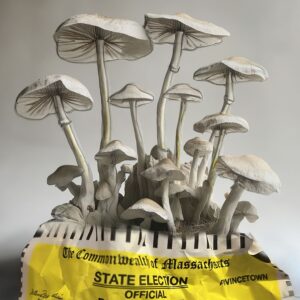PROVINCETOWN — Among the many choices that Massachusetts voters face on Election Day is ballot Question 4, which would legalize and regulate several psychedelic substances.

A “yes” vote would OK an 11-page Natural Psychedelic Substances Act creating a state commission to regulate psychedelic substances, license psychedelic therapy centers, and train and certify practitioners by 2026. It would also allow people over 21 to grow and use five psychedelic substances; to legally possess certain amounts for “personal use”; and to give away that same “personal use” amount to another person over age 21.
The measure was introduced by Massachusetts for Mental Health Options (MMHO), a group that received significant funding from the New Approach Political Action Committee, which paid for successful ballot measures that legalized psychedelics in Oregon in 2020 and Colorado in 2022.
The measure has been criticized by two in-state groups. The Coalition for Safe Communities, chaired by Mass. General Hospital surgeon Anahita Dua, opposes the ballot measure’s home-grow provision, the lack of a requirement for onsite medical professionals at treatment centers, and the potential cost of treatments, which Dua says should be capped.
James Davis, co-founder of the advocacy group Bay Staters for Natural Medicine, says the ballot measure should permit a simpler licensing process that would make treatments cheaper and argues that a psychedelics commission will lead to corruption.
Last December, Davis presented a resolution to the Provincetown Select Board that would both establish psychedelic plants and fungi as the “lowest law enforcement priority for Provincetown” — effectively decriminalizing them — and ask state legislators to replace the text of Question 4 with a different proposal that removed the psychedelics commission and the elaborate licensing requirements from the initiative.
Provincetown’s select board approved that resolution, but the legislature did not make any changes in the ballot measure. Provincetown is one of eight Massachusetts municipalities that passed similar resolutions at Davis’s urging.
The five psychedelic substances — psilocybin, psilocyn, ibogaine, mescaline, and dimethyltryptamine (DMT) — are federally registered as “Schedule 1,” meaning that they have a “high abuse potential with no accepted medical use.”
A growing body of research has challenged that paradigm. The Johns Hopkins Center for Psychedelic and Consciousness Research, for instance, has published evidence that psilocybin, the active ingredient in magic mushrooms, can help smokers quit tobacco, ease anxiety in cancer patients, temporarily relieve depression, and even treat chronic alcoholism.
Emily Oneschuk, a campaign director for MMHO, told the Independent that patients would likely undergo an initial screening with a licensed practitioner, have multiple meetings to establish their personal intentions, ingest the psychedelic at a “wellness center,” and then have further “reintegration calls” afterwards.
Oneschuk used a group psychedelic therapy session to help treat her own PTSD, anxiety, and depression, she said. “It’s not for everybody,” she said, but “it can be a really powerful tool.”
The MMHO’s website lists veterans with PTSD, first responders and health-care workers under job stress, and people with late-stage terminal illness as populations that could benefit from psychedelics.
In Oregon, legalized psychedelic treatments cost between $800 and $3,000, and insurance companies do not cover the cost. The high price has meant that in the first year in which clinics were open in the state, only 3,500 people experienced supervised treatments in Oregon’s 25 clinics, according to a report in the Oregon Capital Chronicle.
Chris Keohan, a spokesman for the Coalition for Safe Communities, said this will likely be the story in Massachusetts as well, adding that people with PTSD, terminal cancer, or psychosis have often exhausted their financial resources.
Many such patients “couldn’t possibly afford this, even if they could have before” their illnesses, he said.
Oneschuk acknowledged that treatment is expensive but said the cost is on par with time spent in therapy or with a chiropractor. She also said group sessions might help reduce costs.
Keohan said that high costs for treatment could drive people to “self-medicate” in an unsupervised setting, which he said is particularly dangerous because people with severe mental health issues are more likely to have a “bad trip.”
One study led by researchers from Johns Hopkins found that 10 percent of people who have a “bad trip” report having put themselves or others in harm’s way. Another study led by researchers from the University of South-Eastern Norway, however, found that people who had “bad trips” often considered them an important part of the process and said they contained “deep existential and life-altering insights.”
The high cost of treatment is also a primary concern for Davis; he told the Independent that costs would go down if facilitation training were cheaper. Oneschuk estimated a 200- to 300-hour training session might cost around $10,000.
The text that Davis had hoped state legislators would endorse would have required potential facilitators to undergo a background check and much more limited training and pay a $155 biannual fee.
Anna Meade, a Provincetown resident who advocated for the decriminalization resolution at the select board last December, told the Independent that she thought the high costs of treatment and the bureaucracy involved in the commission would limit access. Meade said she thought the current ballot measure was “OK” because it allows for home growing and sharing, but she worried that many patients would be unable to access supervised treatments.
Patricia van Dijkhuizen, a Provincetown resident who is a licensed psychedelic practitioner in the Netherlands and also advocated for the decriminalization resolution, said she views the ballot measure as a “first step.”
Van Dijkhuizen said that affordability might be achieved once insurance companies begin covering treatments. “This is not going to happen immediately,” she said, but “you have to start somewhere.”
